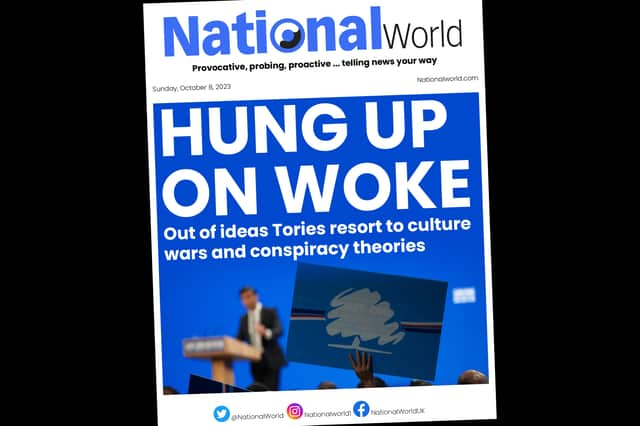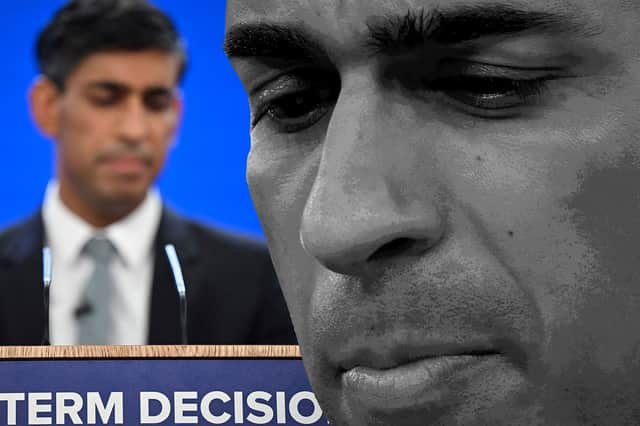Conference long read: Conservatives resort to banning made-up policies after running out of ideas
and live on Freeview channel 276
It was supposed to be the conference to reinvigorate the Conservative Party, showing the country Rishi Sunak and co can make “long-term decisions for a brighter future”.
After last year’s chaos under Liz Truss, MPs, members and activists hoped the 2023 annual meeting of the great and good of the Tory Party would put them on an election footing. Sunak had promised to look to the future, he said he wanted to change politics and, slightly bizarrely, accused Labour of maintaining the status quo.
Advertisement
Hide AdAdvertisement
Hide AdHowever, four days of speeches by Cabinet ministers contained a lot of bluster and rhetoric against the woke brigade, transgender people and of course Labour, and few substantial policies.
It appeared as if the major announcements were being saved for Sunak’s grand finale, however this consisted of a rehash of many existing transport projects across the country to replace HS2 - branded up as Network North - an incremental ban on smoking, and a reform of further education.
The Prime Minister hardly mentioned the cost of living crisis, avoided housing and mortgages altogether - and despite the focus on the future, included nothing for young people. He also hardly mentioned the Tories’ 13-year record in office.
Watching on with a mix of bemusement, surprise and, at times, horror, it struck me that I was observing a party and government which had finally come to the end of the road, bereft of ideas or any sort of overall strategy.


Return of the culture wars
Advertisement
Hide AdAdvertisement
Hide AdThe main thread from the Conservative front bench throughout the conference was culture wars. Almost every minister mentioned the evil of woke, and almost all the so-called policies hinged on it.
Culture Secretary Lucy Frazer’s main announcement was that the government will publish new guidance to protect statues which people have called to be removed. She said: “What some call culture wars, I say is standing up for our principles: pride, tolerance, understanding, learning, respect, fairness and common sense.”
While Science, Innovation and Technology Secretary Michelle Donelan’s main announcement was a review into the use of sex and gender questions in scientific research and statistics, saying that science is under attack from the “slow creep of wokeism”. Surely there are bigger things to worry about in science and technology. At the beginning of the year, Sunak said innovation was the most important thing for the UK to focus on.
Steve Barclay, the Health Secretary, said he would look into changing the NHS constitution to block trans women from using wards intended for biologically female patients. And Suella Braverman’s big policy announcement was to block convicted paedophiles and rapists from changing their gender after conviction.
Advertisement
Hide AdAdvertisement
Hide AdIgnoring potential issues with the equalities act, how many people are actually affected by these policies. Well on the NHS policy, none according to Novara Media. A total of 102 NHS trusts were asked if female patients complained about a transgender woman on the ward, and the answer was zero.
Barclay made barely any mention of social care, which is urgent need of reform. He failed to mention dentists once, despite people all across the country complaining about a lack of access. And the record NHS waiting lists were merely blamed on striking workers.
According to YouGov, health is the second most important issue facing this country, after the economy, and there was nothing to reassure Britons that the Conservatives have the answers.
Conspiracy theories
In some cases, Tory ministers went even further by banning problems which never existed. The new Net Zero Secretary Claire Coutinho claimed that Labour is “relaxed about taxing meat”, despite the party having no such policy.
Advertisement
Hide AdAdvertisement
Hide AdThis led to a wince-inducing exchange with Sky’s Sophy Ridge, who repeatedly asked Coutinho: “What’s the meat tax?” The Cabinet minister answered awkwardly: “They [Labour] are proposing things which are pushing families too hard, you’ve got things like the ULEZ [Ultra-Low Emission Zone] tax which costs £12.50 a day.”
Ridge continued to probe, saying: “That’s not a meat tax, is it?” Coutinho then listed a variety of other Labour policies - none of which was a tax on meat.
Once again, in a hugely important policy area, the government resorted to making up fake policies, instead of tackling the real issues of climate change.
And Transport Secretary Mark Harper claimed that some councils wanted to “decide how often you go to the shops”, repeating conspiracy theories about the concept of 15-minute cities.
Advertisement
Hide AdAdvertisement
Hide AdThe idea, much like most villages, says that cities should be planned so residents are within 15-minutes’ walk of amenities, however it has provoked conspiracy theories suggesting it is part of a plan to impose radical restrictions on people’s movement.
I watched with general astonishment from the Manchester Convention Centre, as these lies were repeated by government ministers. Surely they had something more substantive to say. Their colleague Nicola Richards, MP for West Bromwich East, was forced to remind a fringe event that “sometimes colleagues need a reminder of their language” when discussing conspiracy theories.


All eyes on Sunak
With Cabinet ministers starved of policy announcements, all focus on was on the Prime Minister. He was introduced by his wife in a very Presidential manner, and came out onto the stage to be greeted with waving placards covered in the uncatchy slogan: “Long-term decisions for a brighter future.”
Sunak covered his personal story well, but the paradoxical narrative of Labour being “more of the same” and the unelected Conservative Prime Minister representing change, after 13 years of Tory rule, didn’t add up.
Advertisement
Hide AdAdvertisement
Hide AdAnd the policy announcements were incoherent. He claimed scrapping HS2, watering down net zero, banning smoking and reforming A-levels show he’s got a long-term plan to change politics. But how do those ideas fit together in a wider narrative?
In my snap reaction, I wrote about how Sunak surprisingly avoided the number one issue for voters - the economy - other than to say inflation was coming down, something the Bank of England is responsible for.
Given the dearth of substance earlier in the week, I was hoping the PM would flesh out a really coherent plan for what he stands for and why people should vote for him. Instead it was a lot of empty rhetoric about how we need to change politics, which sounded more like an opposition leader’s speech, and a mishmash of policies as if they were decided by throwing darts at a board.
Will this work?
To win the next election parties will need to have a convincing narrative about their vision for the country and how they can change it for the better. I don’t think Labour have presented this yet either, however their conference is still to come with Pat McFadden promising it will be policy rich.
Advertisement
Hide AdAdvertisement
Hide AdAnalysts fear Sunak is too focused on his base to win on overall majority. Tom Martin, director at Lexington, told Politico: “This strategy is focused on appealing to a clear but perhaps narrow section of the electorate. The party will need to set out a broader agenda going forward if they are to successfully position Rishi Sunak as the change candidate after 13 years of Conservative government.”
Speaking to MPs after the speech, Laura Farris told me: “That is the challenge, but he is a new leader, he is completely different from his predecessors. There is perhaps an implied criticism in some of what he’s saying that politicians, not just his recent predecessors but over the last 30 years, haven’t made long-term decisions in the national interest, they’ve been thinking in election cycles. He’s decided to rip that plaster off, these are generational changes, and he’s defying any opposition party to agree or disagree.”
Sunak is looking for wedge issues, to try and show different with the Labour Party - hence the focus on 20mph speed limits, net zero and likely HS2. But coming to this conference, with his party under pressure in the polls I wanted less rhetoric and more substance. Perhaps, what I found out was that after 13 long years in power the Tories are running out of ideas, and they might also be running out of time.
Comment Guidelines
National World encourages reader discussion on our stories. User feedback, insights and back-and-forth exchanges add a rich layer of context to reporting. Please review our Community Guidelines before commenting.
